Waste Not, Want Not
Two Reasons to Compost
With weeding, harvesting, watering, swimming, kayaking, golf, and biking to do this time of year (not that I do all these), why would anyone spend time making compost? For one or both of two reasons, that’s why.
First, as an environmentally sound way to get rid of so-called “garbage.” Landfilled, the valuable nutrients and organic matter locked up within old broccoli stalks, rotten tomatoes, even old cotton clothes are taken out of our planet’s nutrient cycle almost forever. Landfilling, to me, also disrespects the soil, that thin skin over the Earth that supports much of life here.
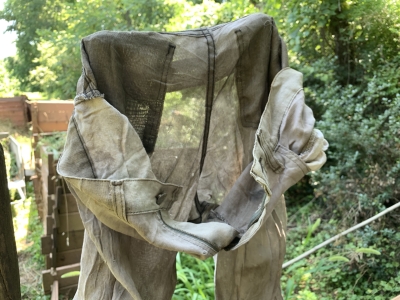
Once Levi’s, now almost compost
This leads to the second reason to make compost now. I require plenty of compost for my gardens so need to scrounge every bit of waste organic material as it becomes available. Even go out of my way to haul it in. Or create it.
Sustainabilityness
Having oodles of compost goes a long way to make a garden or farm truly sustainable. Even though relatively low in nitrogen, as far as plant needs, compost can do away with the need for any other fertilizer.
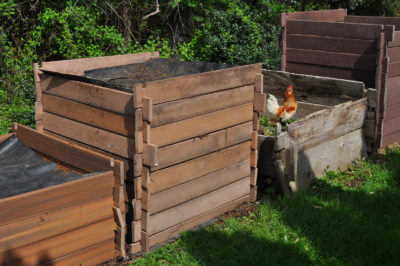
For years, just to make sure that my compost-fed plants were not going hungry — for nitrogen — I spread soybean meal on the ground just before laying down the compost.
Soybean meal provides an organic form of nitrogen but is hardly a sustainable way to nourish the soil. That meal comes from soybeans grown on fields who-knows-where, fed with fertilizers needing fossil fuels for their production, tilled by fossil-fueled tractors, processed in fossil-fueled factories, and transported by fossil-fueled trucks. The same could more or less be said for any fertilizer, organic or otherwise, except compost.
Years ago I made a computation, based on an estimate of how fast nitrogen is released from compost and average nitrogen needs of vegetable plants, of the amount of compost needed to provide all the nourishment a garden would need for one growing season. The amount is about one cubic yard per 300 square feet or, (if you’re a farmer, you should be sitting down), about 70 tons per acre. But these figures are for planted areas, so compost need be applied to only the planting beds.
Also, compost has a residual effect, with only a portion of nutrients being released each year. Yearly additions build soil fertility and nourish a healthy soil life.

On my farmden, a one inch depth of compost provides all the nourishment needed for intensively grown, healthy and healthful crops for an entire season. I just lay the stuff on top of the ground to get the most out of it nutritionally and biologically, and provide a weed-quelling mulch and seedbed.
Self-Analysis
Is making compost truly a way to sustainably nourish the ground? As with so much of agriculture, a balance is sought. Let’s check what goes into my compost piles.
The usual, of course: carrot peelings watermelon rinds, egg shells, old bread, and other fungal and bacterial treats from the kitchen compost bucket; cabbage stalks, old lettuce, and weeds (all even if pest-ridden, diseased, or otherwise) from the garden. I also throw in old cotton or wool clothing, even leather shoes and gloves. Because of noncompostable components such as elastic bands and synthetic cloth parts, they all yield very interesting products staring out in the finished compost.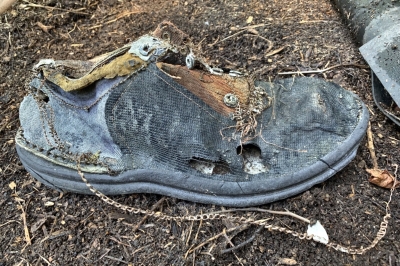 Occasional, light sprinklings of soil add bulk to the finished mix. Occasional, sprinklings of ground limestone keep planted ground, final stop for the compost, in the right pH range.
Occasional, light sprinklings of soil add bulk to the finished mix. Occasional, sprinklings of ground limestone keep planted ground, final stop for the compost, in the right pH range.
Two feedstuffs make up the bulk of the compost. One is horse manure, the most questionably sustainable part of the whole mix. The horse manure is an abundant waste product of a nearby horse farm.
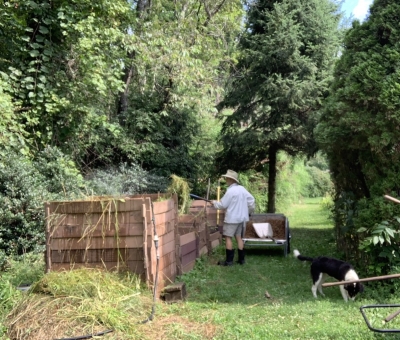
Fashionable
The other feedstuff is hay that I scythe from a one acre field here on the farmden. In mowing hay and composting it, then using the compost to feed my gardens, I am, it seems, “robbing Peter to pay Paul.” But given time, soils regenerate nutrients on their own so I try to rotate which portions of the field I scythe.
Not for You? Then . . .
Making compost isn’t, for reasons of time, space, and inclination, for everyone. In some regions, you can deposit your compostables at a recycling center for composting. And an increasing number of companies are popping up that, for a fee, will pick up your organic waste for recycling. Check web listings for town and county offerings.
I like to make compost, finding it interesting, useful, even enjoyable. And my plants love it.

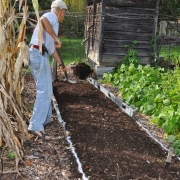

Greetings!
What are your thoughts on Milorganite? My wife uses it to repel deer, which seems to work. I like to add a little to my compost piles (made from shipping pallets), and I occasionally add some Rid-X (bacteria) to the piles. I do not turn my compost piles, but give them at least a year to do their thing.
Sincerely, Carl Mayer
I’ve heard it to be very effective against deer. It basically is composted so I see no reason to add it to a compost pile. No reason to add any bacteria or other microbes per se to a compost pile either. You provide the food for the organisms and they will come.
Great reasons for composting! I’d also add one more: Organic waste that ends up in landfills can’t break down in the way nature intended and instead it produces methane, a powerful greenhouse gas that is contributing to the climate crisis. By composting we avoid these global-heating emissions and, as you said, put food waste to good use by creating a valuable soil amendment.
Yes, good points.
Curious if you use fallen leaves in your compost.
I would use leaves if I needed them but I have plenty of other stuff to add to the compost. Also, I compost all summer long; leaves are available only in fall. I get leaves delivered and leave the pile to rot all season into a nice compost, although it takes longer to make “finished” compost.
What manures, other than horse, do you recommend?
They’re all good but, because of different textures and nutrient concentrations, need to be handled a little differently. I’ve never used pig manure but only because I can’t tolerate the aroma.
I have 3 compost areas in my yard that make black gold for both my vegetable and perenial gardens. I also add brown paper bags, cereral boxes, pasta boxes, and just about anything that comes in a box. I understand the print on these boxes is plant based. Adding cloths, wool, and shoes is new to me!!
I am a huge fan of Milorganite. If ever in Milwaukee visit the recycling plant where milorgante is produced. A little around plants does help to keep the deer away.
You mention diseased weeds go in your compost, what about diseased cultivated plants? For example, tomato plants that have blight, or zuchinni plants stricken by borers? If I include and plan to leave for over a year (and start a new bin come fall) – is it ok to include diseased plants? Thank you!
If your composts look like compost, it’s done. I put everything into my compost pile and use it with confidence when the compost is done.
Is it ok to compost raspberry canes? I have read they should be disposed of off site or burned to avoid disease issues. Thanks
They will take awhile to breadk down because of their woodiness. But yes, I would compost them except that I avoid woody stuff in my compost pile. I don’t avoid putting diseased or pest-ridden in my compost; some combination of time and temperature does the trick.
My compost piles seem to be preservation piles. I have a three bin structure (with a cover), and use kitchen waste, garden waste, grass clippings, and leaves. I started this about a year ago, but have yet to see anything that looks like compost.
I did manage to make a nice home for a black snake, though. 🙂
Wait longer. Things that slow composting: poor aeration from too dense ingredients or too much water (in which case turning the pile and fluffing it up might help); low nitrogen (in which case add manure or soybean meal, probably not the case for your pile); too dry (turn it and add water).
Hi Lee,
I hooked up with a local organic market that gives me scraps for my chickens and the compost pile. However, I have been having an issue with vermin. What do you use to control the problem?
My compost bins, which I’ve described in other blog posts, are somewhat vermin-proof. Also, I dump the contents in the morning so that my dogs can graze it for the high calorie stuff. When I had chickens, they also grazed it; now I have ducks which either are too stupid to or can’t fly up inside of it once it gets built too high. An outdoor cat also helps keep rodents in check.